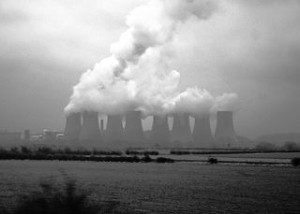Just like with Obamacare, the key is playing offense
 The Environmental Protection Agency is going to release rules next week limiting the amount of carbon dioxide pollution that can be released from power plants. Amidst a lot of worry about the impact this will have on Democrats in an off-year election, apparently the optimistic take on this among Washington Democratic strategists is that it’s an opportunity for Democrats from conservative states to show their “independence” by disagreeing with Obama and his EPA on the need for air pollution standards. As Greg Sargent reports in the Washington Post, the assumption is that red state Democrats should come out against the rules:
The Environmental Protection Agency is going to release rules next week limiting the amount of carbon dioxide pollution that can be released from power plants. Amidst a lot of worry about the impact this will have on Democrats in an off-year election, apparently the optimistic take on this among Washington Democratic strategists is that it’s an opportunity for Democrats from conservative states to show their “independence” by disagreeing with Obama and his EPA on the need for air pollution standards. As Greg Sargent reports in the Washington Post, the assumption is that red state Democrats should come out against the rules:
“It’s an opportunity to say, ‘I disagree with the president, and he’s wrong,'” a Dem strategist advising Senators in competitive races says. “I’m not sure at the end of the day whether people in those states are likely to say, ‘this shows Democrats are trying to screw us,’ or, ‘I’m glad my Democrat is standing up for me, and he will do other valuable things.'”
This advice is weak, even beyond framing support for pollution as “valuable.” It keeps a candidate on the defensive (and as I have said before, stop doing that) and buys into their opponents’ larger world-view about the role of government. Instead, with possibly a couple of exceptions for candidates in coal country, this strategist should stop worrying about the “job-killing regulation” narrative and advise clients to come out swinging. I would tell candidates facing this issue to hit first: “My opponent and the big polluters who write his campaign checks think Congress should interfere and stop the EPA from doing its job of limiting air pollution such as carbon dioxide. I will put our communities and health first.”
Here’s how the data supports a more aggressive approach:
> The EPA is more trusted on dealing with pollution than is Congress. Contrary to perceptions among some elites that the public hates the EPA, 62% of Americans have a favorable view of the EPA. In focus groups I have conducted on environmental issues, even those who have concerns about the federal government in general see limits on air and water pollution as important and exactly why the EPA exists. In fact, they take our air and water protections so much for granted that for them to believe politicians would try to dismantle them, you have to remind voters that big polluters don’t want the rules and donate heavily to political candidates. Compared to this relative trust, Congress has a favorability rating of only 23% in the same Pew study. Specifically on this issue, recent polling for the League of Conservation Voters shows 66% of likely voters in swing states saying they trust the EPA more than Congress to set carbon pollution limits.
> Air pollution, and its impacts on public health, are a serious concern among the public. Gallup polling from March found 73% saying they worry a great deal or a fair amount about air pollution, near the top of a series of environmental issues. While carbon dioxide, and its impact on global warming, may be the impetus for the rules, and it is true that climate change is less of a concern for the public, the reduction in the use of coal fired power plants as a consequence of the new rules will also mean less toxic mercury, benzene, ozone, and other chemicals that cause asthma, heart disease, and other serious health issues, providing a clear opportunity for communications on this topic to focus on air pollution and health.
> The idea that protecting the environment means hurting the economy and losing jobs is not as powerful as many fear. For example, Gallup finds that given a choice, 50% of the public says “protection of the environment should be given priority, even at the risk of curbing economic growth,” compared to only 41% who say “economic growth should be given priority, even if the environment suffers to some extent.” Nearly half (48%) say the U.S. is doing too little to protect the environment, while only 17% say we are doing too much. Although this doesn’t mean the other side can never be successful arguing that environmental rules go too far, it shows that the public does not have the knee-jerk anti-regulation attitude on environmental issues that some expect them to. Those who support stronger limits have a real opportunity to make their case to the public.
I am not trying to claim that support for the new EPA rules is a slam-dunk, particularly in some of the quite conservative states where there will be hard-fought Senate races this year. But, by making a strong case, candidates can show themselves standing up for public health and force opponents to defend standing with polluting campaign contributors instead. This certainly gives them a better shot than evading and defending. (For our Michigan readers, you may be happy to know that Gary Peters gets this – going on the offense and making Terri Lynn Land defend her positions on energy, pollution, and climate change.)
NOTE: this piece edited slightly for clarity



